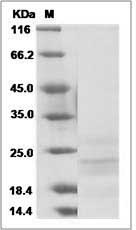-
Product Name
Mouse CD63 / Tspan-30 / Tetraspanin-30 recombinant protein
- Documents
-
Description
The cluster of differentiation (CD) system is commonly used as cell markers in immunophynotyping. Different kinds of cells in the immune system can be identified through the surface CD molecules which associating with the immune function of the cell. There are more than 320 CD unique clusters and subclusters have been identified. Some of the CD molecules serve as receptors or ligands important to the cell through initiating a signal cascade which then alter the behavior of the cell. Some CD proteins do not take part in cell signal process but have other functions such as cell adhesion. Cluster of differentiation 63 (CD63) is a member of the CD family and the transmembrane 4 superfamily,also known as the tetraspanin family. CD63 is a cellular surface glycoprotein characterized by the presence of four bydrophobic domains. CD63 had functions in mediating signal transduction processes and then regulate variety of cellular processes such as cell proliferation, activation and motility. It has reported that CD63 protein associated with tumor progression and served as a blood platlet activation marker and the deficiency of this protein may be associated with Hermansky-Pudlak syndrome.
-
Protein name
CD63 antigen
-
Protein short names
MGC107286; MLA1; LAMP-3; MGC103180; OMA81H; CD63; C75951; TSPAN30; ME491
-
Uniprot ID
Q549D0
-
Gene Name
Cd63
-
Source/Expression Host
Human Cells
-
Expression Plasmid/cDNA
A DNA sequence encoding the rat Cd63 (NP_031679.1) (Ala103-Ile203) was expressed with two additional amino acids (Gly & Pro ) at the N-terminus.
-
Protein Species
Mouse
-
Molecular weight
The recombinant rat Cd63 consists 103 amino acids and predicts a molecular mass of 11.6 kDa.
-
Purity
> (5.6+73.7+8.4) as determined by SDS-PAGE.
-
Validations

Rat CD63 / Tspan-30 / Tetraspanin-30 Protein
Related Products / Services
Please note: All products are "FOR RESEARCH USE ONLY AND ARE NOT INTENDED FOR DIAGNOSTIC OR THERAPEUTIC USE"
